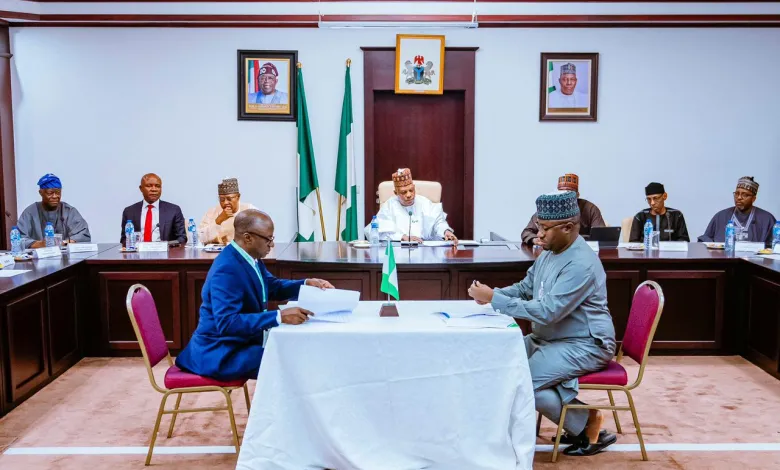Vice President Kashim Shettima, reaffirmed President Bola Tinubu’s commitment to economic reforms aimed at fostering inclusive growth and bridging financial gaps across Nigeria.
While the administration has set ambitious targets, including a trillion-dollar economy by 2030, achieving these goals requires tangible action beyond policy pronouncements.

The 2030 Vision and Its Foundations
Speaking at the inauguration of the Presidential Committee on Economic and Financial Inclusion at the State House, Abuja, Shettima emphasized that achieving financial inclusion is critical to economic expansion.
The event also saw the signing of an investment agreement by private sector stakeholders, signaling intent to build foundational infrastructure to operationalize the Aso Accord initiative.
Despite progress since the launch of the Financial Inclusion Strategy in 2012, where inclusion rates improved from 60.3% to 74%, as of 2023, millions of Nigerians remain excluded from financial systems. Shettima stressed that “dreams are not built on hope alone,” highlighting the need for deliberate strategies.
Key Steps to Turning Vision into Reality
For Nigeria to achieve its trillion-dollar economy target, the government must move beyond declarations and implement pragmatic measures to ensure these policies translate into real economic growth.
1. Strengthening Digital and Financial Infrastructure
A critical enabler of financial inclusion is the availability of robust digital and financial infrastructure. Expanding mobile banking, fintech solutions, and internet penetration in rural areas will enhance access to financial services, bringing millions of unbanked Nigerians into the formal economy.
2. Enhancing Public Awareness and Financial Literacy
A significant barrier to financial inclusion is low awareness. Many Nigerians remain unbanked due to a lack of knowledge about financial services.
Government agencies, in collaboration with financial institutions, should launch nationwide campaigns to educate citizens on the benefits of savings, investments, and digital transactions.
3. Providing Regulatory and Institutional Support
Achieving economic transformation requires an enabling business environment. The government should implement policies that reduce bureaucratic bottlenecks, simplify taxation for MSMEs, and provide incentives for financial institutions to expand their reach into underserved regions.
4. Mobilizing Private Sector Participation
Public-private partnerships (PPPs) will be essential in driving Nigeria’s economic expansion. Private sector stakeholders, particularly in fintech, banking, and agriculture, must be incentivized to invest in economic inclusion initiatives. The agreement signed at the State House Banquet Hall marks a step in the right direction, but more collaboration is needed to sustain momentum.
5. Leveraging Technology for Financial Inclusion
Technology remains a key driver in closing financial gaps. The government should expand the adoption of blockchain, mobile wallets, and digital payment systems to make transactions easier and safer. Encouraging startups to innovate around microfinance and peer-to-peer lending platforms will also boost access to credit for small businesses.
6. Addressing Systemic Barriers Faced by Vulnerable Groups
Youth, women, MSMEs, and rural populations continue to face structural barriers in accessing financial services. Special economic programs tailored to these groups, such as government-backed microloans and grants, can help bridge this gap and unlock their economic potential.
7. Sustaining Political Will and Long-Term Commitment
For Nigeria’s trillion-dollar economy vision to materialize, the government must demonstrate sustained commitment beyond the current administration. Policy consistency, transparency in fund allocation, and measurable key performance indicators (KPIs) should be established to track progress and ensure accountability.
The inauguration of the Presidential Committee on Economic and Financial Inclusion and the signing of the Aso Accord investment agreement mark significant milestones in Nigeria’s economic journey.
However, success will depend on execution. By strengthening digital infrastructure, improving financial literacy, mobilizing private sector investment, and addressing systemic barriers, Nigeria can turn its trillion-dollar economy ambition from policy into reality.
The road to 2030 is paved with opportunities, but only deliberate action will ensure that Nigeria’s economic growth is inclusive, sustainable, and transformative.

